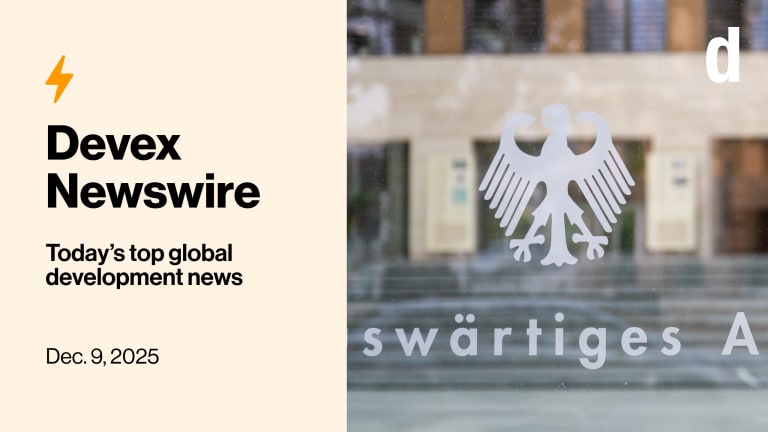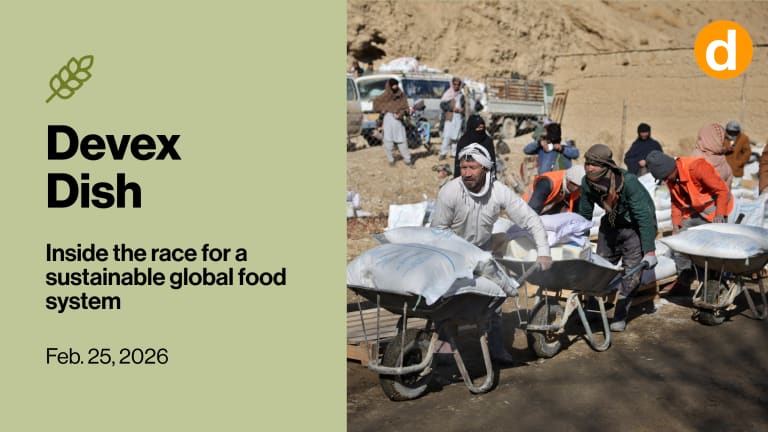
Greetings from the Organisation for Economic Co-operation and Development in Paris, where I’m covering the latest aid stats out today.
The preliminary figures for 2021 just landed. Here’s what they show.
This is a preview of Newswire
Sign up to this newsletter for an inside look at the biggest stories in global development, in your inbox daily.
Official development assistance for 2021 was 0.33% of the combined gross national income of the 30 donors on the OECD’s Development Assistance Committee. That’s unchanged from 2020 and below the United Nations target of 0.7% ODA to GNI.
Foreign aid from official donors rose to an all-time high of $179 billion in 2021, up 4.4% in real terms from 2020. However, 3.5% of that went to providing COVID-19 vaccines to low- and middle-income countries. Excluding ODA for donated COVID-19 vaccines, ODA was up 0.6%.
The effects of COVID-19 — and now support for refugees from Ukraine — have many worried about how much aid remains for pursuing all of the SDGs in LMICs.
In response to the figures, Amy Dodd, policy director at ONE Campaign, says the overall aid levels are insufficient to meet growing needs, which include responding to the pandemic, tackling climate change, and averting a new debt crisis.
“Unless urgent action is taken - on aid, to tackle the debt crisis and mobilise new finance - the latest aftershocks from the invasion of Ukraine will hit people and countries already struggling to cope,” she says.
Jeroen Kwakkenbos, Oxfam’s EU aid expert, also warns that “donors have thrown out the rule book by counting vaccine donations in aid budgets.”
“Including these ‘donations’ in aid budgets inflates aid. It is merely donors patting themselves on the back for a job that may have cost lives,” he says.
We’ll have more interviews and analyses on the 2021 figures in the coming days.
Don’t forget Afghanistan
Will the war in Ukraine pull much-needed funding from Afghanistan? That’s the fear, my colleague Miguel Antonio Tamonan reports, in a timely look at aid trends in the country.
Based on UNOCHA’s estimate, $4.4 billion is needed to respond to Afghanistan’s humanitarian needs in 2022. But even before the crisis in Ukraine, donations were below the levels needed to hit this target. So far, with more than a quarter of the year gone, only $632.5 million, or 14.2% of the total amount needed, has been committed through the U.N.’s humanitarian response plan, with $235.7 million already disbursed.
For Devex Pro subscribers, Miguel also has funding insights on the World Bank, Gates Foundation, USAID, and many more. Catch up on his work.
Afghanistan: The state of humanitarian aid (Pro)
More for Pro subscribers: The EU’s development boss, Jutta Urpilainen, told me in February that she felt that the international community needs — but is currently missing — a common three-to-four-year strategy in Afghanistan.
+ Not gone Pro yet? Start your 15-day free trial to get deeper analysis of the development sector.
‘A sharp intake of breath’
That’s how academics Arran Hamilton and John Hattie say people have been responding to their latest work covering more than 100 things that education systems could remove, reduce, reengineer, or replace for more efficient impact.
Among them:
• Teachers do not necessarily need degree-level qualifications in the subjects they teach, and they might not really need degrees at all.
• The hours per week and years of schooling that each child receives could be reduced, or at least not increased — without a negative impact on their learning.
• Children can be taught more effectively in mixed-age classrooms, with peers tutoring one another.
• School autonomies, public-private partnerships, and performance-related pay are blind alleys that have limited impact on student outcomes.
The global education funding gap is estimated at more than $200 billion per year, and the pair write in this op-ed for Devex: “We are totally in favor of adding more resources. But until it turns up, we advocate for efficient realism in the here and now.”
Opinion: Avert the global learning crisis by doing less — but better
Meal ticket
The Bill & Melinda Gates Foundation has awarded $11 million to the Food and Agriculture Organization for the next stage of its Monitoring and Analysing Food and Agricultural Policies program for African countries.
FAO said it will use advanced economic modeling and other tools to determine whether food and agriculture budgets are ensuring food security and nutrition, as well as boosting economic growth in eight African countries.
“It will also help countries to prioritize the most beneficial reforms first and help with policy implementation, no doubt the trickiest part of the policy cycle,” according to FAO spokesperson Craig Lawson.
Read: Gates Foundation awards $11M to FAO for African food policy program
+ Sign up to Devex Dish for the latest news and insights on the global food system, and receive the latest edition — which tackles FAO’s Food Price Index hitting its highest level ever in March — Wednesday.
In other news
Chile announces an unprecedented plan to ration water in the capital city of Santiago, as a record-breaking drought enters its 13th year. [The Guardian]
Doctors in Sri Lanka are warning that a huge number of people could die as the country's health care system is nearing collapse due to the economic crisis. [Al Jazeera]
Women in Ukraine have accused Russian soldiers of acts of sexual violence — including rape. [BBC]
Sign up to Newswire for an inside look at the biggest stories in global development.
Search for articles
Most Read
- 1
- 2
- 3
- 4
- 5








